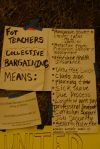Day 1 of the Wisconsin People’s Assembly
Tonight I attended two panel discussions that were part of the Wisconsin People’s Assembly. This event was organized by Wisconsin Wave and Wisconsin Resists. It also included participants from many other organizations. Wisconsin Wave is a force opposed to “corporatization and austerity, for democracy and shared prosperity for all.” This is a 2 day event in Madison, Wisconsin that is bringing together Wisconsinites from all walks of life to discuss the Wisconsin movement, learn from each other, and plan for what’s next.
I tweeted a-ha moments during the panels, but I’d like to reflect a little further.
Building a Popular Movement
(panelists included Rep. Spencer Black, Nii Adjatey, Erika Wolf, Kabzuag Vaj, Monica Adams, Tina Trevino)
This panel included speakers that have all been involved the Wisconsin movement lately, but had previously been organizing around many different issues.
All of the speakers shared their backgrounds in organizing, what they have seen or learned over the past 6 weeks, and what they see as essentials to building a popular movement. Adams and Trevino were both very involved in the capitol occupation. Trevino shared that her a-ha moment was to remember where the power really comes from. It doesn’t come from certain organizations claiming to organize this or that large event. It comes from the people. We really need to bring everyone to the table.
A common theme was that we need to truly include people and create a united front. Vaj said that we need to go beyond saying “people of color should be here.” We need to build real, long, lasting relationships.
We should acknowledge that while these cuts and unions busting are “attacks on the middle class,” they will harm the poor, people of color, non-English speaker, and others far more.
It can’t be just about unions and workers rights. It can’t be just about recalls and making sure we get out the vote. People of color know that they have to look at alternatives to the systems that have continued to fail them. Are any of the candidates that run in opposition to recalled senators really going to be on the side of the people and the poor, not just the “middle class”? We also need to know that people that are fighting for survival – food, healthcare, safety, etc. – are not going to have working on recalls be their priority.
We need to get past any us vs. them. We need to make an effort to team with others and make it a broad campaign. Together, no one loses. This is our great opportunity!


